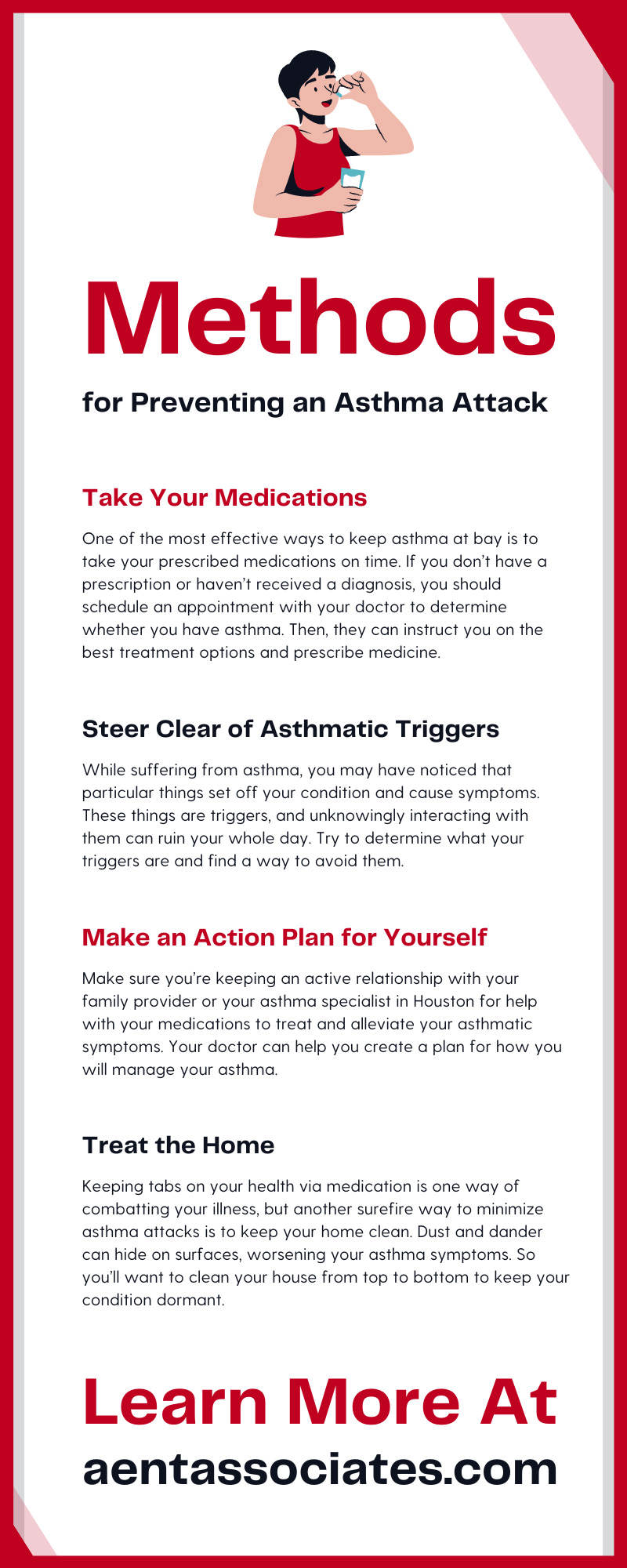
Suppose you have asthma or know someone who does. Fortunately, there are several ways to treat this common lung disease. While doctors don’t know much about how it comes about, science and medicine have determined things that may cause it to become active. Luckily, they’ve also learned how to alleviate the symptoms. Some methods have proven to keep episodes dormant altogether. Here are six methods for preventing an asthma attack and helping you live relatively asthma-free.
Take Your Medications
One of the most effective ways to keep asthma at bay is to take your prescribed medications on time. If you don’t have a prescription or haven’t received a diagnosis, you should schedule an appointment with your doctor to determine whether you have asthma. Then, they can instruct you on the best treatment options and prescribe medicine. Many medications on the market these days are effective and can completely alleviate symptoms.
Steer Clear of Asthmatic Triggers
While suffering from asthma, you may have noticed that particular things set off your condition and cause symptoms. These things are triggers, and unknowingly interacting with them can ruin your whole day. Try to determine what your triggers are and find a way to avoid them.
Air Pollution
When you’re traveling, you’ll need to check the weather of where you’ll be staying before you leave to see what the air quality will be like. If you can know what the conditions are like in advance, you’ll know how to keep yourself from having an episode. Additionally, you can plan ahead and bring extra medication with you if the air quality isn’t favorable.
Allergens Abound
At certain times of the year, like in the spring, you’ll notice an abundance of flowering and pollinating going on. This pollen can become airborne, so you’ll need to keep this in mind before going outdoors since it’s a common asthma trigger. You’ll also notice that when these allergens settle on hard surfaces, they can stay there until you remove them. You’ll need to stay aware of this and clean any surfaces that may come into contact with pollen.
The Dry and Cold Air
Sometimes the weather alone can trigger your symptoms. Dry air will irritate your lungs and dry them out, causing pain and discomfort. Cold temperatures can make the dry air even worse, so this is something to be aware of if dry and cold air triggers your symptoms. If you have to go outside during these unfavorable conditions, consider wearing a face mask or scarf to prevent yourself from getting to this point.
Bacterial and Viral Infections
If you’re feeling under the weather and think you might have a bacterial or viral infection, you should be careful, as this can also cause you to have asthma attacks. You don’t want to add more suffering on top of your infection, so stay on your normal medications unless your physician suggests otherwise. Make sure you get a diagnosis for the infection so that you can also treat the illness in combination with your asthma for the best outcome.
Extreme Exercise
Also, try to avoid excessive exercise. Extreme exercises can cause injury, but they can also cause asthma flare-ups. Over-exerting yourself will cause you to respirate at a high volume, which can overwork and dry out your lungs. Under these conditions, your asthma will have a higher probability of acting up. So you’ll need to be careful about choosing your exercises.
Smoking Anything
Of course, smoking is bad for your general health, but it can also cause asthma. Sometimes individuals can get away with it if they don’t smoke often. However, it’s best to avoid smoking altogether because it can cause flare-ups and worsen your symptoms.
Make an Action Plan for Yourself
Make sure you’re keeping an active relationship with your family provider or your asthma specialist in Houston for help with your medications to treat and alleviate your asthmatic symptoms. Your doctor can help you create a plan for how you will manage your asthma. There are short-term and long-term plans, and your provider will give you medication suggestions based on your chosen path.
If you choose the short-term route, you can treat the symptoms with medicines you take as needed, like inhalers and pills. Or you can go with the long-term plan, which will keep you symptom-free for the whole day. With this plan, you may need to take medications every day before you can even step outside.
Treat the Home
Keeping tabs on your health via medication is one way of combatting your illness, but another surefire way to minimize asthma attacks is to keep your home clean. Dust and dander can hide on surfaces, worsening your asthma symptoms. So you’ll want to clean your house from top to bottom to keep your condition dormant.
Stay Up-to-Date on Your Vaccines
Because we covered illnesses previously, this should be a no-brainer. Staying up-to-date on your vaccines will make you less likely to contract any disease. The symptoms from one illness can cause other illnesses to become active, which can compromise your immune system. Then, you put yourself at a higher risk of an asthma flare-up. If you get your vaccines, you have a better chance of avoiding those situations and staying healthy.
Use a Home Peak Flow Meter
With a home peak flow meter, you can monitor your progress with your asthma as you go about your daily life. These unique devices can track symptoms leading up to potential attacks so that you can keep an eye on your health. You’ll know in advance when things are worsening, so you can take care to avoid triggers and take your medication before an attack starts.
These six methods for preventing an asthma attack can hopefully help those with the illness get through these episodes on their own. Whether you want to go the natural route or take medications, you can manage your asthma and prevent flare-ups. If you follow this guide, you should have no problem moving forward and enjoying your life asthma-free.




